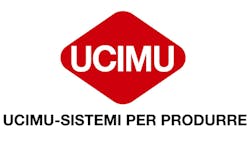The Italian machine tool manufacturers’ association UCIMU reported that its members first-quarter orders declined -9.8% versus orders for the first quarter of 2012, continuing the negative trend that marked most of last year for the group. UCIMU noted the decline in new orders has continued for four consecutive quarters, though the group’s total sales for 2012 increased over the previous year.
UCIMU-Sistemi per Produrre represents Italian manufacturers of machine tools, robots, and automation equipment, with more than 200 member companies whose products represent about 70% of that market, one the more prolific source of industrial equipment in Europe.
As Europe endured debt and currency concerns through 2012, manufacturers watched their volume of orders decline. The problem was noticeable across much of the European Union, in particular in Italy, which has a strong domestic manufacturing sector as well as a considerable export-driven economy.
For the first quarter of 2013, UCIMU’s machine tool order index indicated domestic orders for machine tools and related equipment decreased -35.9% against the results of the first quarter of 2012. The absolute value, 44.4%, is the lowest ever recorded by the organization, and reconfirms “the serious weakness of the domestic market,” according to the group’s statement.
As for exports, the index of orders showed a -4.6% decrease, with an absolute value of 151.6 — “still above average,” according to UCIMU, “but nevertheless not enough to reassure Italian manufacturers, who are experiencing a gradual decrease of orders.”
UCIMU president Luigi Galdabini said the results clearly demonstrate that “the loss of competitiveness that the political situation is forcing on the whole country is having a strong impact on the industrial sector. The extended uncertainty that we have been experiencing for months is draining all desire of investing from Italian companies.
“The halt in machine tool investments,” he added, “indicates a progressive and unavoidable loss of competitiveness of the whole country.Without the acquisition and the replacement of production machinery, user sectors will be unable to face the challenge of foreign competitors, whose investments in advanced technologies, although slightly slower than normal, will enable them in the short term to align themselves to us as far as production capacity and quality are concerned."
Exports Not Enough
Galdabini went on to argue that Italian manufacturers have done well to maximize the available exporting advantages, but he said the survival of such companies can rely forever on exports.
“It is important that companies are located inside a strong and receptive market, supported by a suitable state, that provides them with the means to compete with foreign manufacturers," he said.
Then, he called on Italian political leaders to form a new consensus government that can agree on measures to promote industrial development in the country.
Galdabini reiterated several recommendations that UCIMU has made in recent months, including a call for revised lending regulations that would allow borrowers to extend repayment terms at favorable interest rates for up to five years, more generous amortization schedules for capital investments, and tax benefits to companies that invest in new equipment and technology.
He also called for efforts to stimulate economic activity in Italy, “measures that promote consumption.” This should include lower corporate and payroll tax rates, reduced export taxes, and new lending programs (“minibonds”) to help companies stabilize their financial structure and access new sources of liquidity.
“The need to support small and medium companies is determined by the fact that they represent the interests of all the components of society,” according to the UCIMU president.“Entrepreneurs, working employees, and families, are all united in the common interest of the company:a healthy company that operates in a healthy market guarantees employment and income for all its members.”
About the Author
Robert Brooks
Content Director
Robert Brooks has been a business-to-business reporter, writer, editor, and columnist for more than 20 years, specializing in the primary metal and basic manufacturing industries.
